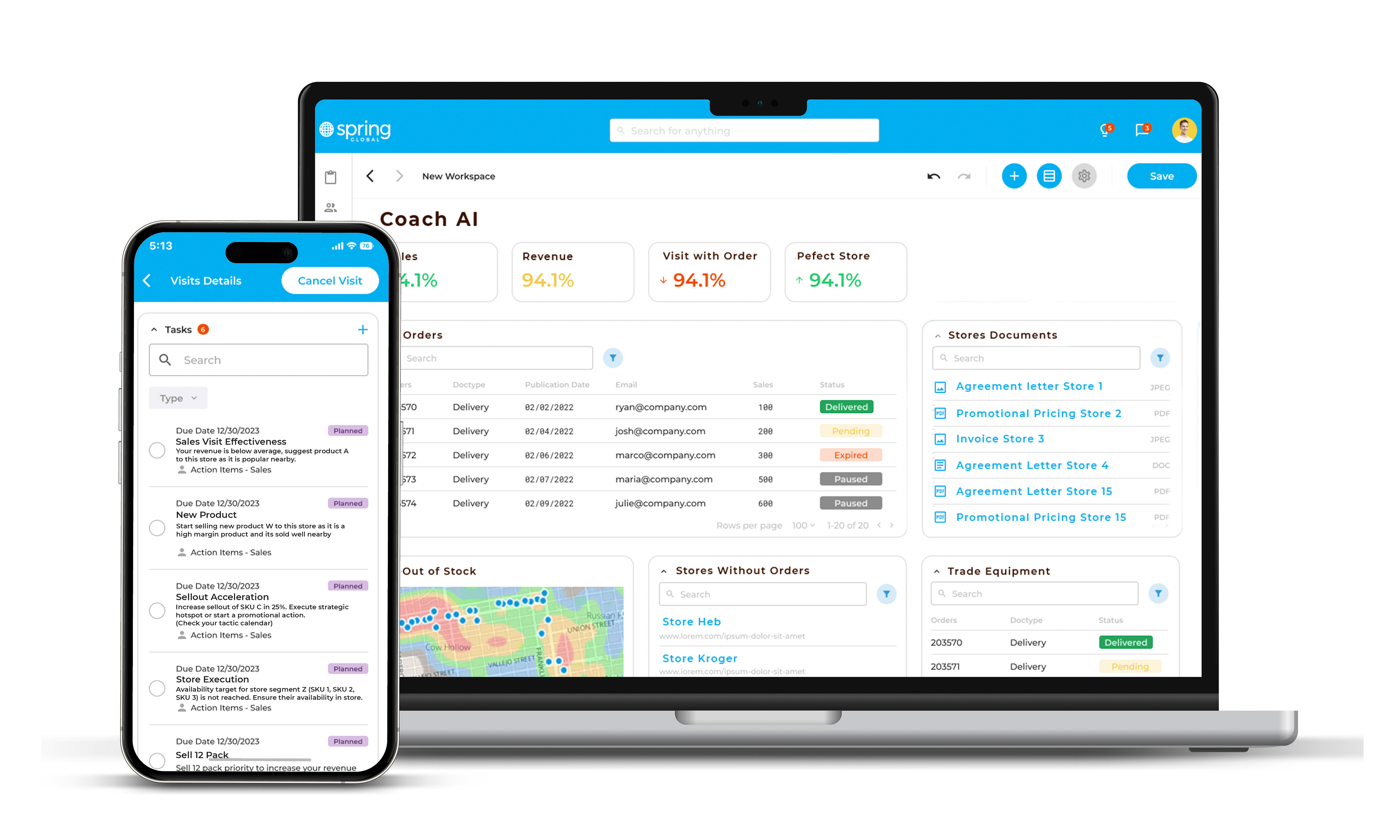How CPG companies can optimize performance using Artificial Intelligence
In the competitive landscape of the Consumer Packaged Goods (CPG) industry, success isn't just about producing high-quality products; it's also about how well those products are executed and showcased in retail stores. Effective in-store execution is a critical element for boosting revenue, increasing volume, and optimizing product mix.
Companies spend millions designing optimal product placement schemes and eye-catching displays to increase product visibility in stores, but all of this is wasted if they aren’t properly executed.
Retail execution is highly dependent on the willingness of store managers to implement, and the ability of the CPG’s field reps to execute properly. With the onset of exceptionally high turnover rates, this is becoming even more challenging, because reps aren’t armed with the data-driven selling stories they need to gain buy-in and are struggling to get promotion execution correct for each specific store.
In this first of a four-part series on leveraging artificial intelligence (AI) and machine learning (ML) to address the Four Pillars of Retail Execution (optimizing performance, boosting revenue & assortment, accelerating product turnover, and improving retail execution), we will talk about how we see AI optimizing performance by providing field teams with the expertise they need for perfect field execution.

Auto-generated selling stories
By engaging customers in meaningful conversations based on actual data, reps are transformed into consultative sellers. But who is going to create and disseminate all this information, ensuring it gets to the right reps in the right stores at the right time?
What store managers want to know is, ‘What’s in it for me?” Information like how sales have been impacted when displays have been properly executed, and what are the proper product mixes to carry based on a store’s demographics is invaluable when trying to convince store owners to agree to your recommendations. The information is all out there, but good luck trying to locate it and then make it meaningful and specific to each store.
There just isn’t enough time in the day for humans to pull off this herculean task, and that makes this job a perfect fit for machine learning and generative AI. You can leverage these technologies to scan your data sources, learn from trends over time, and create curated selling stories that illustrate the potential benefits of activities being suggested in the store based on actual data from stores with similar demographics. All of this can be accomplished in a matter of seconds.
Additionally, AI can be leveraged to disseminate the right support material to field reps within each store visit plan in the right place at the right time. One example would be providing suggestions to reps to set up a secondary display or propose a new product to enhance the product mix. Within those instructions are selling stories such as, “Stores like yours are seeing a 2-3% increase in sales when executing this display or taking on this new product.”
The result is a very guided experience for the field rep with all the instructions and data they need right there within the context of their store visit. Your team is transformed by helping every rep produce the same outcomes as highly trained and experienced sales reps. This leads to increases in revenue and volume, and an optimal product mix at every store.

Anomaly detection and resolution playbooks
According to the Promotion Optimization Institute’s 2023 State of the Industry Report, only 21% of CPG companies feel they have good retail execution, yet proper retail execution is a critical component of driving revenue. At Spring Global, our customers are telling us that this is a result of poor visibility into what is going on in the field, and the inability to ensure employees are highly trained in their retail execution techniques because of high employee turnover.
This is why we are leveraging advanced AI and ML algorithms to recognize intricate patterns and relationships within your data to identify anomalies and prescribe the right actions to take to remedy them. Over time, the technology begins to autonomously identify anomalies and their underlying causes, then sends playbooks to both managers and field reps containing automated suggestions for how to eliminate issues and enhance store performance.
As a result of this, managers spend less time poring over reports, performing in-person store audits, and other non-value-add activities, and more time focusing on customer relationships, mentoring field reps. Not only is performance increased, but it becomes easier to retain today’s generation of employees because they are using modern tools that reduce the amount of mundane and tedious tasks.

Retail execution playbooks based on comprehensive data integration
Another symptom of high employee turnover is lack of sales rep knowledge of how to react to issues such as weather-related events, seasonal demands, and the impact on demand triggered by things like sporting events, holidays, graduation season and more.
This requires comprehensive integration data from both internal and external sources, including data related to sales, shelf space, competitor activities, weather conditions, promotions, and point of sale data (such as Nielsen and IRI). By scanning and associating all these data points, AI can generate store-specific playbooks that automatically suggest activities for the sales rep to ensure optimal sales and proper product mix. This arms reps with a deeper understanding of sales trends and demands, without having to take the time to become an expert, because technology does it for them.
One example of this would be using weather data to understand that a hurricane is heading toward southern Florida, then leveraging historical weather-related data juxtaposed against sales records during similar weather events to automatically instruct the field rep to modify orders for stores in that area to include extra pallets of water to keep up with impending demand.
Follow us to get the next in our four-part series on leveraging artificial intelligence (AI) and machine learning (ML) to address the Four Pillars of Retail Execution:
- Optimizing performance
- Boosting revenue & assortment
- Accelerating product turnover
- Improving retail execution
Learn more about our AI- and ML-powered platform, Coach AI here.
